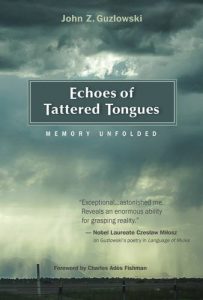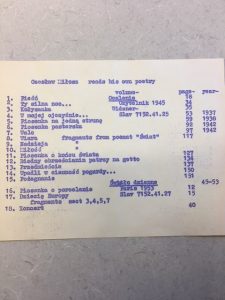By Marek Sroka
One of the most interesting examples of traumatic experiences of war and displacement are the poems of John Guzlowski, “arguably the most accomplished Polish-American poet on the contemporary scene.”[1] Guzlowski, who was born in a displaced persons’ camp in Vienenburg, Germany, after World War II, came with his parents and sister to the United States as “DPs” (“displaced persons,’ the term Guzlowski uses to describe their status) in 1951. Inspired by the wartime experiences of his parents, the author has been writing poems about his parents’ lives addressing the tragedy of war, the trauma of displacement, and the anguish of immigration. Moreover, the topics he highlights in his poetry did not disappear after World War II. Instead, new conflicts erupted that resulted in massive displacement of populations in various parts of the world, including present war in Ukraine. In one of his most powerful poems, “Landscape with Dead Horses, 1939,” Guzlowski introduces audiences to the Polish experience of Nazi Germany invasion of Poland in 1939 and confronts them with tragedy of all wars. Here is the opening verse:
War comes down like a hammer, heavy and hard
flattening the earth and killing the soft things:
horses and children, flowers and hope, love
and the smell of the farmers’ earth, the coolness
of the creek, the look of trees as they unfurl
their leaves in late March and early April
(from Echoes of Tattered Tongues)[2]
Another poem worth mentioning is “Cattle Train to Magdeburg,” in which Guzlowski recreates the experience of his mother’s deportation to Nazi Germany where she would work as a slave laborer. The poem deals with the universal and often lifelong trauma of displacement caused by wars. Here is a fragment:
My mother still remembers
The long train to Magdeburg
the box cars
bleached gray
by Baltic winters
The long twilight journey
to Magdeburg-
four days that became six years
six years that became sixty
And always a train of box cars
bleached to Baltic gray
(from Lightning and Ashes)[3]
Guzlowski’s poems are emotionally powerful and are anchored in his parents experience as forced laborers and country-less refugees. Yet, his poetry has universal relevance giving voice to countless refugees displaced and traumatized by wars in the past and current centuries.
[1] Thomas Napierkowski, “Lightning and Ashes: The Poetry of John Guzlowski,” Polish American Studies, no. 1 (Spring 2008): 86-93.
[2] John Z. Guzlowski, Echoes of Tattered Tongues (Los Angeles, California: Aquila Polonica Publishing, 2016).
[3] John Z. Guzlowski, Lightning and Ashes (Bowling Green, Kentucky: Steel Toe Books, 2007).




